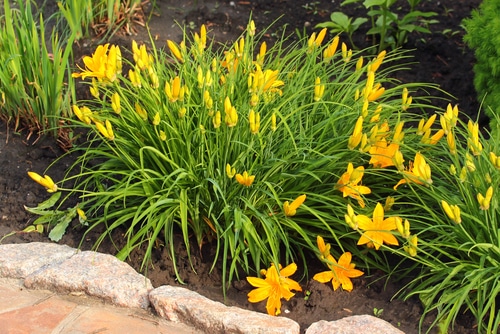
Garden mulch can improve the soil's nutrients and reduce compaction. It will also prevent erosion from walking in the garden and from gravity on steep slopes. Many gardeners use garden compost as their mulch to provide additional benefits to the soil. A good compost is the perfect compliment to any mulch. Garden compost can be used in the same way as mulch. When used properly, it will make the soil more fertile and improve the health of plants.
For cutting gardens, you might want to use weed blocking mulch to protect them from the summer heat. Straw can also be used to let in water and moderate soil temperatures. Straw is easy to blow and contains weed seeds. Be sure to replace it each year. It is not suitable to be used in vegetable gardens as it is highly flammable. It is best to keep it in a container, which can be placed in a shed.

Newspaper is another option for garden mulch. It is simple to stack a few newspapers on your lawn. They will eventually decompose over a year so you can reuse them in your garden. You can remove the excess mulch by adding organic mulch to the surface. This will allow the soil to become more porous, which will allow roots to penetrate the soil and water to flow through. By doing so, you will be helping the environment while protecting your plants.
Mulch offers many benefits. However, it should not be confused with its synthetic or biodegradable characteristics. Mulch made from synthetic materials is not biodegradable. These materials often contain black polypropylene, which is harmful for plants. These mulches won't decay like regular papers and can result in a fungus, or the death of a plant. You should also be aware that while a mulch can be composted, it won't break down like regular paper does.
Mulch can also be used to improve the health of your garden. Mulch is a great way for soil moisture retention and can improve the organic matter content in your garden. Mulch can help retain nutrients and water. You need to select the right mulch type for your garden. This will make it beautiful and healthy. Landscape fabric is the most commonly used type of mulch. There are many kinds of garden mulch. This mulch is made of shredded leaves. It will not decompose and will retain moisture in soil.

In addition to being beneficial for your garden, it can also help keep weeds under control. Besides preventing weeds, mulch is also good for your soil and prevents weeds. It blocks light and prevents weeds growing. This is the greatest benefit of garden mulch. Mulch will preserve and maintain the soil's moisture. It will protect your plants against pests and other harmful effects.
FAQ
How much light does a tree need?
It depends on which plant it is. Some plants require 12 hours of direct sunlight per day. Others prefer 8 hours of indirect sunlight. Most vegetables require 10 hours direct sunlight in a 24-hour period.
Can I grow vegetables indoors?
Yes, it is possible to grow vegetables in a greenhouse during winter. You will need a greenhouse or grow lighting. Before buying a greenhouse, check with your local laws.
Do I have to purchase special equipment in order to grow vegetables on my own?
It's not true. All you need to do is use a shovel, trowels, watering containers, and maybe even a rake.
Statistics
- According to a survey from the National Gardening Association, upward of 18 million novice gardeners have picked up a shovel since 2020. (wsj.com)
- Most tomatoes and peppers will take 6-8 weeks to reach transplant size so plan according to your climate! - ufseeds.com
- According to the National Gardening Association, the average family with a garden spends $70 on their crops—but they grow an estimated $600 worth of veggies! - blog.nationwide.com
- It will likely be ready if a seedling has between 3 and 4 true leaves. (gilmour.com)
External Links
How To
How can I keep my vegetable garden weed-free?
Growing healthy vegetables is difficult because of weeds. They compete for space, water, nutrients, sun, and sunlight. These are some tips to prevent them from taking control of your garden.
-
All plants should be removed when they are in flower
-
Get rid of any plant debris that may be around the base.
-
Mulch can be used
-
Water regularly
-
Rotate crops
-
Do not allow the grass to grow.
-
Keep soil moist
-
Plant early
-
Harvest often
-
Make compost
-
Avoid using chemical pesticides
-
Get organic vegetables
-
Heirloom seeds available
-
Start small
-
Learn about companion planting
-
Be patient
-
Enjoy gardening!